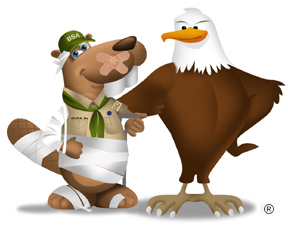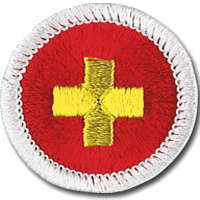First Aid


Resources
Related
First Aid Requirements
Current Scouts BSA requirements
as of February 19, 2026
as of February 19, 2026
1.
Handling a First Aid Emergency. Do the following:
a.
Explain the steps necessary to assess and handle a first aid emergency,
including a safety evaluation of the scene.
b.
Tell how you would obtain emergency medical assistance from your home
and from a remote location on a wilderness camping trip.
c.
Demonstrate the precautions you must take to reduce the risk of
transmitting an infection between you and the victim while administering
first aid, including the safe disposal of used first aid supplies.
d.
Demonstrate evaluation of and management of a patient's airway and
breathing.
e.
Demonstrate a thorough examination of an accident victim.
f.
Discuss why shock is an emergency.
g.
Define the term triage and describe examples of triage situations that
you may encounter.
2.
Preparing for First Aid Emergencies. Do the following:
a.
Obtain a copy of the Scout Annual Health and Medical Record and discuss
the importance of the form including information on immunizations,
allergies, medications, health history, and medical examinations to
providing first aid at Scouting events.
b.
Using checklists provided in the First Aid merit badge
pamphlet or ones approved by your counselor, do the following:
1.
Assemble a personal first-aid kit for hiking and backpacking.
Demonstrate the proper use of each item in your first-aid kit to
your counselor.
2.
With your counselor, inspect a unit, home, vehicle, or camp
first-aid kit and discuss your findings.
3.
Wounds with No External Bleeding. Describe the symptoms and signs
of, show first aid for, and explain prevention of these wounds:
a.
Closed wounds, such as a bruise (contusion) or a hematoma
b.
Superficial, partial thickness, and full thickness thermal (heat) burns
or scalds
c.
Chemical burns
d.
Electrical burns
e.
Sunburn
f.
Snow blindness
g.
Immersion foot, frostnip, frostbite, and ice burns
h.
Abrasions, such as chafing and rope burns
i.
Blisters on the hands, feet, buttocks, and shoulders
j.
Puncture wounds from splinters, rope splinters, nails, and fish hooks
k.
Rash from poisonous plants
l.
Bug bites of chiggers, ticks, mosquitoes, and biting gnats
m.
Bee stings
n.
Bites of spiders
o.
Sting of a scorpion
p.
Bite of a pet or wild mammal or human
q.
Bite of a venomous snake
4.
Bleeding Wounds. Describe the symptoms and signs of, show first aid
for, and explain prevention of these wounds:
a.
A nosebleed.
b.
An open wound with mild or moderate bleeding, such as a scratch or a
scrape (abrasions), or a shallow cut (laceration).
c.
An open wound with severe bleeding such as a deep cut on an arm or leg.
d.
Explain when it is appropriate and is not appropriate to use one or
more tourniquets. List some of the benefits and dangers of using a
tourniquet. Demonstrate the application of a tourniquet without
tightening it.
5.
Breathing Emergencies. Describe the symptoms and signs of, show
first aid for, and explain prevention of these conditions affecting
breathing:
a.
Choking
b.
Asthmatic attack
c.
Anaphylaxis from an insect bite or sting or from food or product
allergy
d.
Inhalation injuries
e.
Altitude sickness
6.
Loss of Consciousness. Describe the symptoms and signs of, show
first aid for, and explain prevention of these conditions causing loss of
consciousness:
a.
Fainting
b.
Hypoglycemia
c.
Seizure
d.
Drug overdose and alcohol poisoning
e.
Underwater hypoxic blackout
f.
Cold water shock and drowning
g.
Lightning strike and electric shock
7.
Heart Attack. Do the following:
a.
Explain what a heart attack is.
b.
Describe the symptoms and signs of a heart attack and first aid for
this condition.
c.
Describe the conditions that must exist before performing CPR on a
person.
d.
Demonstrate proper CPR technique using a training device approved by
your counselor.
e.
Explain the use of an automated external defibrillator (AED).
f.
Demonstrate or simulate the proper use of an AED, using an AED training
device if available.
g.
Identify the typical location(s) of one or more AED(s) at public
facilities in your community, such as, your school, place of worship,
unit meeting place, sports facilities, and/or camp or by using a smart
phone app. Discuss the reasons for choosing locations like these.
8.
Muscle and Bone Injuries. Do the following:
a.
Explain the similarities and differences in a strain, a muscle tear, a
tendon rupture, a sprain, a dislocation, a simple fracture, and a
compound fracture.
b.
Describe the symptoms and signs of and first aid for a muscle strain, a
muscle tear, and a tendon rupture.
c.
Describe the symptoms and signs of, and potential complications of, a
sprain, a fracture, and a dislocation.
d.
Demonstrate bandages for these injuries:
1.
Arm slings for forearm or upper arm or collarbone fractures
2.
Elastic wrap and cravat bandages for ankle sprain
3.
Elastic wrap and cravat bandages for wrist sprain or hand injury.
e.
Demonstrate the proper procedures for handling and splinting of
suspected closed or open fractures or dislocations of the:
1.
Finger and toe
2.
Forearm or wrist
3.
Upper leg
4.
Lower leg or ankle
9.
Head and Spine Injuries. Do the following:
a.
Describe the symptoms and signs of, relationships between, possible
complications of, and prevention of head, neck, and back injuries.
b.
Describe the symptoms and signs of and first aid for a concussion.
c.
Demonstrate first aid for an open head wound with a triangular or other
bandage.
d.
Demonstrate first aid for someone with a suspected neck or back injury.
10.
Moving a Patient. Do the following:
a.
Describe the conditions under which an injured person should and should
not be moved.
b.
If a sick or an injured person must be moved, tell how you would decide
the best method. Demonstrate these methods.
c.
By yourself and with a partner, demonstrate how to transport a person
from a smoke-filled room.
d.
By yourself and with a partner, demonstrate how to transport a person
with a sprained ankle for at least 25 yards.
e.
With helpers under your supervision, improvise a stretcher and move
a presumably unconscious person for at least 25 yards.
11.
Heat- and Cold-Related Conditions. Describe the symptoms and signs
of, show first aid for, and explain prevention of these conditions
associated with exertion and/or heat or cold exposure:
a.
Dehydration and over-hydration
b.
Heat cramps and muscle pain after exertion
c.
Heat exhaustion
d.
Heat stroke
e.
Chest pains associated with cold exposure
f.
Hypothermia
12.
Mental Health Conditions. Describe the following:
a.
Reactions associated with at least three stressful situations, such as
mountain backpacking, rappelling, a ropes course, speaking before an
audience, making a phone call to an adult, taking a swim test, missing
home, lighting a match, trying out for a sports team, meeting someone
for the first time, or other stressful circumstances.
b.
The actions that you and others should take to prepare for and manage
these situations.
c.
The indications that someone might be a danger to themselves or others.
d.
The actions that you should take if you suspect that someone might be a
danger to themselves or others.
13.
Miscellaneous Conditions. Describe the symptoms and signs of, show
first aid for, and explain prevention of the following conditions:
a.
Object in the eye
b.
Broken, chipped, loosened, or knocked out tooth
c.
Vomiting and diarrhea associated with food poisoning
d.
Abdominal pain
e.
Stroke
14.
With guidance from your counselor, develop a plan to teach a first-aid
skill or topic using the EDGE method. Discuss your skill, topic, and plan
with your counselor, and then teach your skill or topic to your family or
to one or more Scouts.
15.
Do ONE of the following:
a.
Visit an emergency medical station house or training center in person.
From the medical first responders that you meet during your visit,
learn about how they serve their community and about their careers.
Discuss with your counselor what you learned during your tour and
interviews.
b.
Interview an emergency medical services professional about their work.
Learn about how they chose this career and about their duties. Discuss
what you learned with your counselor and whether you might be
interested in this career.
c.
Identify three career opportunities that would use skills and knowledge
in emergency medical services. Pick one and research the training,
education, certification requirements, experience, and expenses
associated with entering the field. Research the prospects for
employment, starting salary, advancement opportunities, and career
goals associated with this career. Discuss what you learned with your
counselor and whether you might be interested in this career.
d.
Identify how you might use the skills and knowledge in the field of
emergency medical services to pursue a personal hobby and/or healthy
lifestyle. Research the additional training required, expenses, and
affiliation with organizations that would help you maximize the
enjoyment and benefit you might gain from it. Discuss what you learned
with your counselor and share what short-term and long-term goals you
might have if you pursued this.